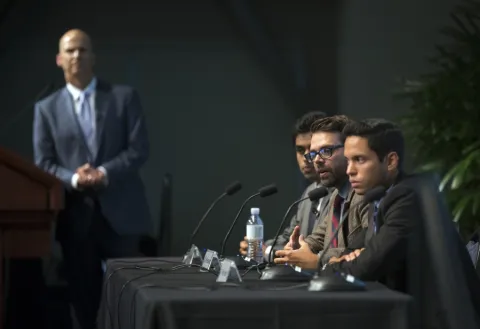UCSB Entrepreneur Competition Chooses Winners

Six teams of entrepreneurs battled it out Thursday at UCSB's Corwin Pavilion in the 17th annual New Venture Competition, with the winner taking home $12,500 to put toward prototype inventions and businesses.
Ideas ranged from a device to help people with eczema to a way to turn brewery waste into sustainable packaging products.
In the end it was the startup Osmo that won the grand prize for a portable water sampling device that could more easily and accurately detect the health of sea and fresh waters.
"First of all, we're going to be protecting our intellectual property, filing patents," Kyle Neumann, Osmo's team leader and originator. "And beyond that it will be developing the business, taking it out in the field and really beat the heck out of it. The ocean is harsh, so I really want to know that it will work for a long period of time."
Mr. Neumann, a graduate student in marine science, brought onto his team a mix of majors and levels: Rahul Sangodkar, a Ph.D student in chemical engineering; Edixon Puglisi, an undergrad in global studies; and Anjana Krishnan, a second-year master's student in environmental science and management.
The idea started when Mr. Neumann was attending Oregon State University as an undergrad and studying the impact of fracking on streams and drinking water. "I realized we didn't have a good way of studying this," he said. "We didn't have a tool that would allow us to gather the data that we needed."
David Adornetto , entrepreneurship program director, says the competition "can be a nice launching pad for companies that want to take the next step and start a business. We encourage groups, even if they don't win, to not end their quest. There's potential to start a business."
That was true of the EVMatch team, which pitched its company that would help electric vehicle owners connect with owners of EV charging structures.
Team members Heather Hochrein, Shannon Walker, two of the four on their all-female team, are all set to complete their master's degrees and go right into business, along with taking their idea to several other similar competitions.
"We're working on this as if it's going to be our livelihood," said Ms. Walker.
Mr. Adornetto can claim success for former teams turning into profitable businesses. The winners of the 2001 competition went on to start Inogen, a public company that still operates out of Goleta with annual revenues of well over $100 million.
More recently, Trackr, which allows people to find personal objects easily with their phone, has opened downtown offices, raised venture capital, and has their ads all over television.
So the competition is much more than an exercise. Investors make up a good percentage of the audience during the event and are included on the judging panel.
Because the ideas can be so varied, judges vote on fundability.
"Is the problem real, is the solution effective, is the idea protectable through patents, and is the market size large enough to grow" are just some of the factors the judges consider, Mr. Adornetto said.
In second place, winning $7,500 was Vibe, which makes sonar-like gloves for sight-impaired people, and in third place, winning $2,500, was EVMatch.
By Ted Mills, Santa Barbara News-Press

 Facebook
Facebook Instagram
Instagram LinkedIn
LinkedIn Twitter
Twitter